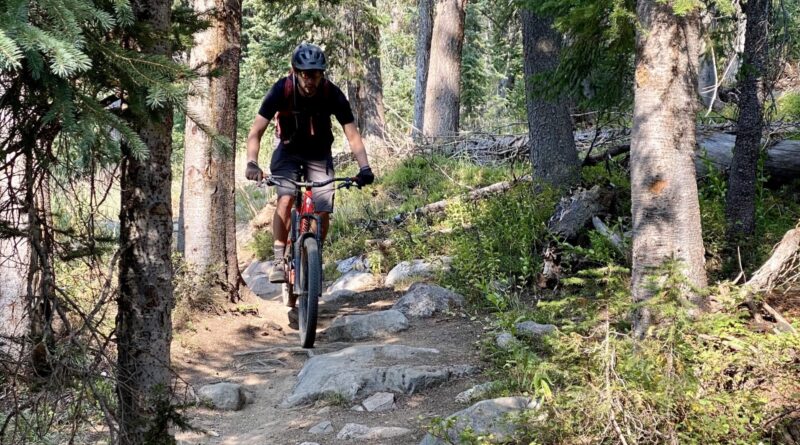CPW, Forest Service stake out “turf war” over Mad Rabbit trails
Colorado Parks and Wildlife is reviving a previously settled objection to a U.S. Forest Service plan for trail improvements near Rabbit Ears Pass.
CPW and the Colorado Department of Natural Resources first objected to the Forest Service plan for new trails in the fall of 2023, arguing that more singletrack on forest land around Rabbit Ears Pass would stress elk herds and fragment habitat. Wildlife and recreation officials with the state and Routt National Forest spent nearly a year working on a compromise — they called it an Adaptive Management Plan — that would reduce the reach of new trails, rehabilitate unauthorized trails and limit development in critical elk habitat.
Now, CPW is resuscitating its objections to the Mad Rabbit project, saying the Forest Service’s “last-minute alterations to the Adaptive Management Plan are significant and unacceptable to Colorado.”
After negotiating the Adaptive Management Plan through all of 2024, CPW pulled its objection to the Mad Rabbit project late last year. However, when the Forest Service last month issued its final approval of the project after nearly a decade of discussion and study, there were changes, mainly the removal of a proposed elk study.
“Communication regarding this project ceased toward the end of 2024,” reads a letter CPW sent to Routt National Forest officials April 21, saying that the Forest Service “made substantive changes removing meaningful, essential components of the Adaptive Management Plan that had previously been agreed upon.”
The crux of the state’s objections revolves around an elk study that CPW says the Forest Service agreed to conduct before trail construction. The final decision also removed CPW as the agency monitoring elk migration within the project area.
“CPW no longer has a formal role in determining if substantial changes to elk distribution and herd use within the project area have occurred,” reads the letter signed by Department of Natural Resources Director Dan Gibbs.
Aaron Voos with the Routt National Forest said a wildlife study before trail construction was not part of the Adaptive Management Plan, but the agency plans active wildlife monitoring and adjustment to trail development as the project unfolds in phases. The draft of the final decision published last fall, however, included $33,000 to launch an elk monitoring study and $6,500 a year to continue that study. That funding note was not part of the final decision issued last month.
After CPW dropped its previous objection to the Mad Rabbit project, the Steamboat Springs City Council in December voted to direct as much as $1.6 million from the city trails fund toward the project. With CPW reviving its objection, trail advocates fear the council may adjust its funding plan for a project that has collected more than 1,400 comments — a vast majority of them in support of the new trails — as part of an eight-year review under the National Environmental Policy Act.
Larry Desjardin, with the hunter-focused Keep Routt Wild, which has fought to limit the Mad Rabbit trails project since its inception, said his group will push the Steamboat Springs council to study any changes to the Adaptive Management Plan before finalizing the trail funding at its May 19 meeting.
“Did the Forest Service not only mislead DNR and CPW, but also the Steamboat Springs City Council? They need to get to the bottom of this,” Desjardin said.
The original plan suggested 79 miles of new trails but public input and wildlife concerns whittled that to 49 miles, with rehabilitation of 36 miles of unauthorized trails across 127,124 acres of the national forest. The project also imposes seasonal wildlife closures of trails.
“CPW has tried to make a power play to delay this project, siding with elk hunters who want to limit access to trails. The Forest Service has said ‘You can’t change the goal posts on us after we reached an agreement’ and they are flexing their own power play,” said Steamboat Springs resident Craig Frithsen, who has worked with the trail and bike advocacy group Routt County Riders to add the new trails between Mad Creek and Rabbit Ears Pass.
“What’s going on here is a turf war. The hunters want exclusive access to the national forest on Rabbit Ears and limit trail development to keep others out. This has been studied for years and years. This is a well-planned trail network put in appropriate places to protect wildlife and other forest resources.”


